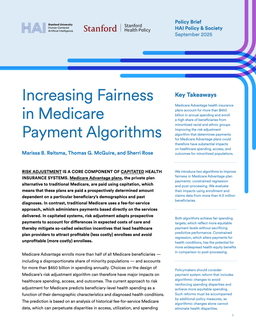Ethics, Equity, Inclusion
How can AI be designed to ensure fairness, transparency, and inclusivity?
Dan Iancu & Antonio Skillicorn | Interpretable Machine Learning and Mixed Datasets for Predicting Child Labor in Ghana’s Cocoa Sector
Child labor remains prevalent in Ghana’s cocoa sector and is associated with adverse educational and health outcomes for children.

Child labor remains prevalent in Ghana’s cocoa sector and is associated with adverse educational and health outcomes for children.
HAI Co-Director Fei-Fei Li named one of America's top 250 greatest innovators, alongside fellow Stanford affiliates Rodney Brooks, Carolyn Bertozzi, Daphne Koller, and Andrew Ng.
HAI Co-Director Fei-Fei Li named one of America's top 250 greatest innovators, alongside fellow Stanford affiliates Rodney Brooks, Carolyn Bertozzi, Daphne Koller, and Andrew Ng.
How Can AI Support Language Digitization and Digital Inclusion?

This white paper analyzes the varying ways AI tools can advance language digitization work, and provides recommendations for responsibly realizing the potential of AI in supporting the digital inclusion of digitally disadvantaged languages.

This white paper analyzes the varying ways AI tools can advance language digitization work, and provides recommendations for responsibly realizing the potential of AI in supporting the digital inclusion of digitally disadvantaged languages.
HAI Co-Director James Landay urges people to think about what "AI for good" means today. He argues, "we need to move beyond just thinking about the user. We’ve got to think about broader communities who are impacted by AI systems if we actually want them to be good.”
HAI Co-Director James Landay urges people to think about what "AI for good" means today. He argues, "we need to move beyond just thinking about the user. We’ve got to think about broader communities who are impacted by AI systems if we actually want them to be good.”
Moving Beyond the Term "Global South" in AI Ethics and Policy

This brief examines the limitations of the term "Global South" in AI ethics and policy, and highlights the importance of grounding such work in specific regions and power structures.

This brief examines the limitations of the term "Global South" in AI ethics and policy, and highlights the importance of grounding such work in specific regions and power structures.
All Work Published on Ethics, Equity, Inclusion
AI Leaders Discuss How To Foster Responsible Innovation At TIME100 Roundtable In Davos
HAI Senior Fellow Yejin Choi discussed responsible AI model training at Davos, asking, “What if there could be an alternative form of intelligence that really learns … morals, human values from the get-go, as opposed to just training LLMs on the entirety of the internet, which actually includes the worst part of humanity, and then we then try to patch things up by doing ‘alignment’?”
HAI Senior Fellow Yejin Choi discussed responsible AI model training at Davos, asking, “What if there could be an alternative form of intelligence that really learns … morals, human values from the get-go, as opposed to just training LLMs on the entirety of the internet, which actually includes the worst part of humanity, and then we then try to patch things up by doing ‘alignment’?”
Increasing Fairness in Medicare Payment Algorithms

This brief introduces two algorithms that can promote fairer Medicare Advantage spending for minority populations.
This brief introduces two algorithms that can promote fairer Medicare Advantage spending for minority populations.


Axios chief technology correspondent Ina Fried speaks to HAI Senior Fellow Yejin Choi at Axios House in Davos during the World Economic Forum.
Axios chief technology correspondent Ina Fried speaks to HAI Senior Fellow Yejin Choi at Axios House in Davos during the World Economic Forum.
Mind the (Language) Gap: Mapping the Challenges of LLM Development in Low-Resource Language Contexts

This white paper maps the LLM development landscape for low-resource languages, highlighting challenges, trade-offs, and strategies to increase investment; prioritize cross-disciplinary, community-driven development; and ensure fair data ownership.
Mind the (Language) Gap: Mapping the Challenges of LLM Development in Low-Resource Language Contexts
This white paper maps the LLM development landscape for low-resource languages, highlighting challenges, trade-offs, and strategies to increase investment; prioritize cross-disciplinary, community-driven development; and ensure fair data ownership.

Elon Musk was forced to put restrictions on X and its AI chatbot, Grok, after its image generator sparked outrage around the world. Grok created non-consensual sexualized images, prompting some countries to ban the bot. Liz Landers discussed Grok's troubles with Riana Pfefferkorn of the Stanford Institute for Human-Centered Artificial Intelligence.
Elon Musk was forced to put restrictions on X and its AI chatbot, Grok, after its image generator sparked outrage around the world. Grok created non-consensual sexualized images, prompting some countries to ban the bot. Liz Landers discussed Grok's troubles with Riana Pfefferkorn of the Stanford Institute for Human-Centered Artificial Intelligence.


